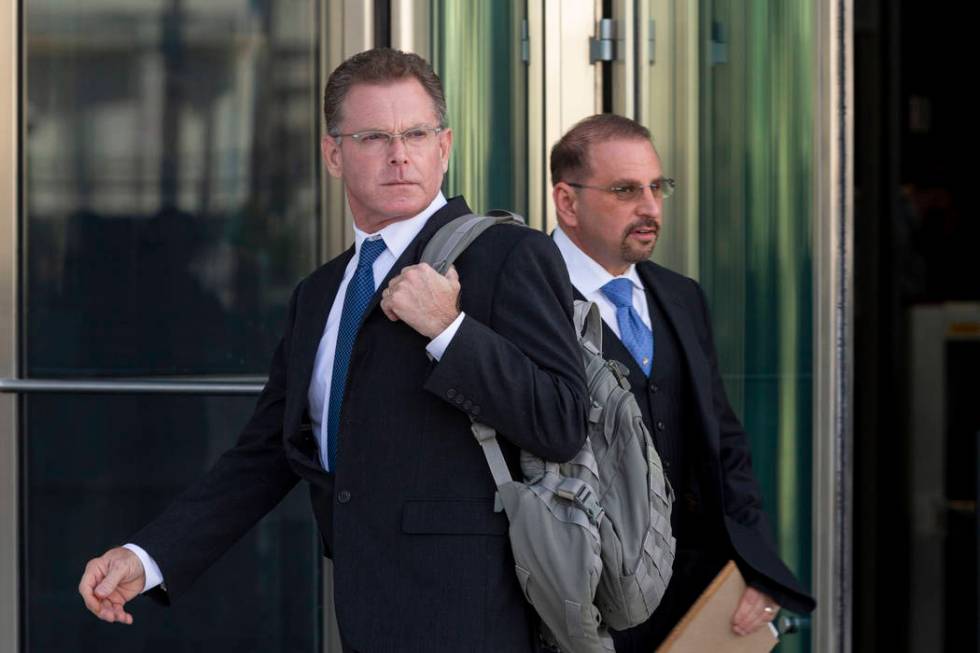Arizona man who sold ammo to Las Vegas shooter pleads guilty

The Arizona man accused of selling illegally manufactured ammunition to the Route 91 Harvest festival gunman pleaded guilty Tuesday in federal court, closing a chapter in the only criminal case to stem from the Las Vegas massacre.
Douglas Haig, 57, of Mesa, Arizona, faces up to five years in prison after pleading guilty in Las Vegas to one felony count of manufacturing ammunition without a license. A sentencing is scheduled for Feb. 19.
Haig’s Arizona attorney, Marc Victor, gave a brief statement to reporters just outside the courthouse after the plea hearing.
“It’s important to note Doug had no indication whatsoever about Stephen Paddock’s plans,” Victor said, referring to the gunman. “Doug was absolutely devastated when he learned of the tragedy on Oct. 1, 2017. He was particularly devastated to learn he had previously sold ammunition to Stephen Paddock.”
The guilty plea means Haig will avoid a Las Vegas jury trial that he and his legal team had fought from the start.
Victor tried and failed in June to secure a bench trial for his client, fearing bias from potential jurors. A bench trial allows a judge, not a jury, to determine guilt. But Senior U.S. District Judge James Mahan denied the request.
When the bench trial request failed, Victor asked that Haig’s trial be held in Reno to minimize potential bias from Las Vegas jurors. That also failed.
Victor previously asked that Haig be tried in Arizona — his home state and where at least one of the sales took place — for the same reason. That request was denied as well.
Facing a Nevada jury trial, Victor in January asked that government prosecutors not be allowed to mention the Route 91 attack or the gunman when presenting their case. Mahan refused the request in part, excluding some evidence pertaining to Route 91 but noting that procedural safeguards, including jury instructions, would help “minimize the risk of prejudice.”
Haig in February also asked that his case be dismissed, arguing that the statute he is accused of violating is “unconstitutionally vague.” Mahan also denied that motion.
The defendant was accused of selling illegally manufactured rounds to Paddock ahead of the Oct. 1, 2017, attack, which left 58 concertgoers dead and hundreds more injured. The gunman opened fire on the crowd from a Mandalay Bay suite across the street before fatally shooting himself.
A 59th shooting victim died Friday in California, but officials have not updated the death toll of the massacre.
Inside Paddock’s suite, investigators allegedly found ammunition with reloading tool marks packed into an Amazon shipping box that listed Haig’s address.
They also found ammunition that Haig sold to Paddock loaded into five rifles and one magazine in the suite, according to court records. Haig’s attorney has said none of those rounds were fired during the attack.
Federal investigators interviewed Haig shortly after the shooting, and prosecutors in 2018 charged him in connection with the sales. They never accused Haig of having any prior knowledge of Paddock’s plans.
Before the attack, Haig had been working as an engineer at Honeywell in Arizona while operating a personal ammunition business, Specialized Military Ammunition, out of a workshop at his home. Through the business, he sold personally manufactured ammunition both online and at gun shows, including at least one in Nevada.
It was through Specialized Military Ammunition that Paddock purchased ammunition from Haig.
“Defendant knew that federal firearms law required a license to engage in the ammunition manufacturing business that he was conducting,” according to his signed plea agreement, filed Tuesday. “Despite this knowledge, defendant knowingly and willfully engaged in the business without first obtaining a federal firearms license permitting his activity.”
Haig shuttered his ammunition business on Oct. 19, 2017, about two weeks after the attack. But through at least 2018, he continued working at Honeywell, sitting about 15 feet away from his coworker Andrew Fowler, who court records indicated also worked with Haig at the now-shuttered Specialized Military Ammunition business.
A court order allowed them to continue working together and talking to each other at Honeywell as long as they only talked at work and about work. But Haig was barred from speaking with more than 100 others as his criminal case moved forward, though that list of people was never made public.
As part of Haig’s plea, his inventory of more than 600 pounds of various ammunition and ammunition components became subject to government forfeiture. He also could face a fine. His felony plea means he will not be allowed to own a gun, both by Arizona and federal law.
Contact Rachel Crosby at rcrosby@reviewjournal.com or 702-477-3801. Follow @rachelacrosby on Twitter.